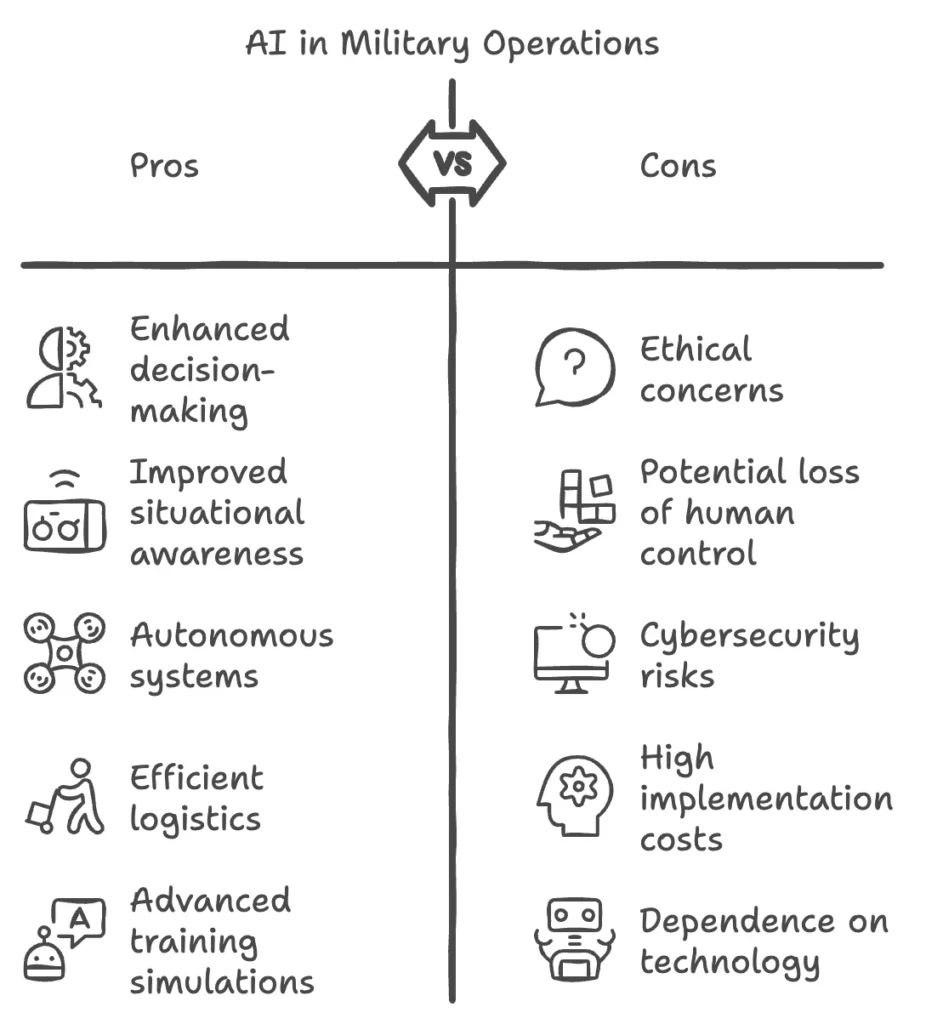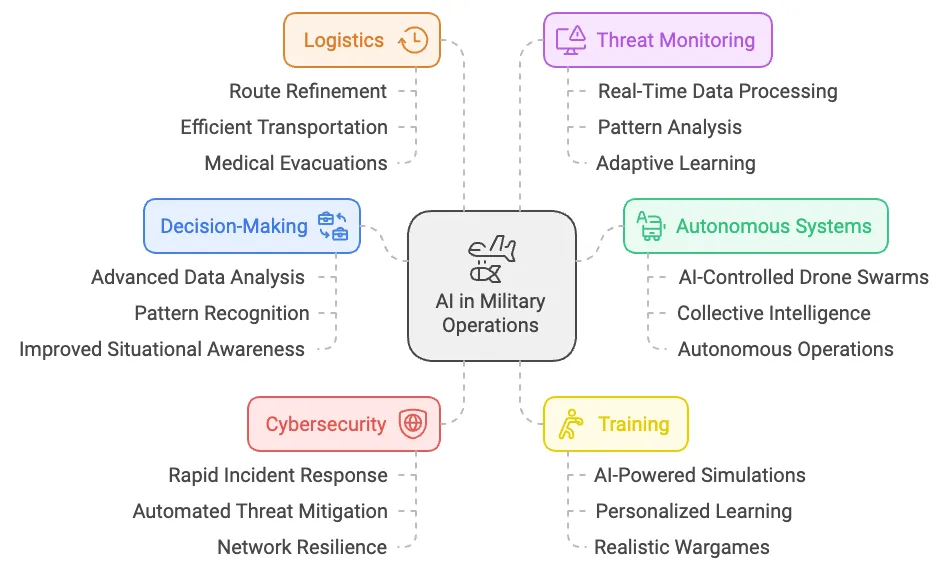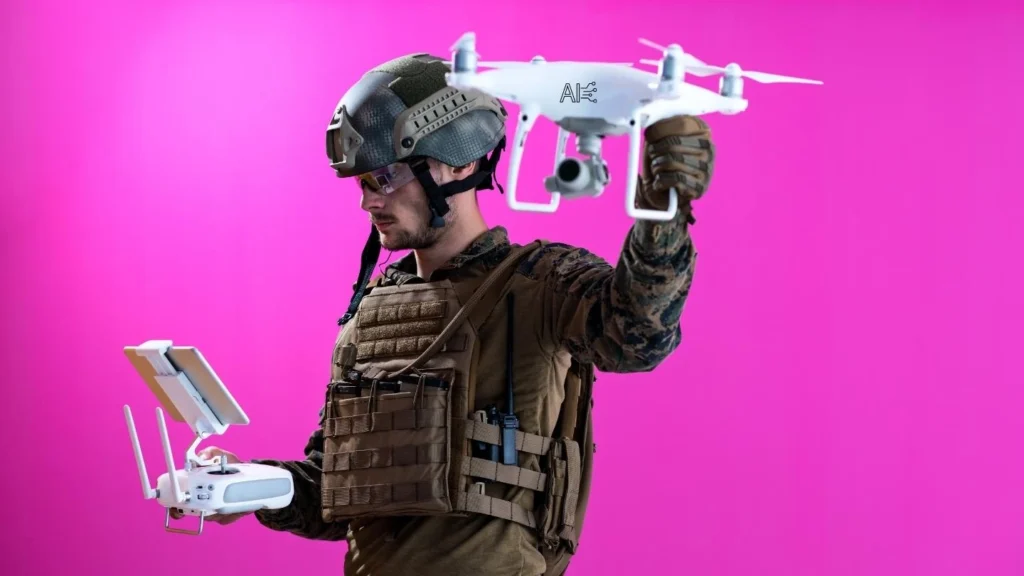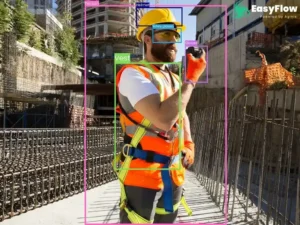AI transforms military operations across multiple domains. It enhances decision-making, improves situational awareness, and boosts operational efficiency.
Advanced data analysis and autonomous systems, like AI-controlled drone swarms, enable independent operations and rapid intelligence gathering. AI algorithms aid in strategic planning, threat monitoring, and cybersecurity, while also optimizing logistics and transportation.
In combat scenarios, AI improves target recognition and tactical effectiveness. Military training benefits from AI-powered simulations and personalized learning materials.
As AI continues to evolve, its impact on military capabilities and strategies promises to be profound and far-reaching.
Key Takeaways
Understanding AI in Military Context
The battlefield of tomorrow is being reshaped by artificial intelligence, a transformative force in military operations. AI’s integration into military systems has changed decision-making processes, operational efficiency, and strategic capabilities. Through advanced data analysis and pattern recognition, AI enhances situational awareness and enables rapid responses to emerging threats.
Military applications of AI extend to various domains, including natural language processing and computer vision. These technologies facilitate real-time intelligence gathering and improve communication in the field.
Autonomous systems, such as AI-controlled drone swarms, demonstrate the potential for independent operation in both training and actual missions, mimicking collective intelligence for enhanced effectiveness.
AI’s role in military training is equally significant, with simulation software providing realistic wargames and generating customized training materials. This approach improves soldier preparedness for diverse scenarios.
Additionally, AI optimizes logistics by streamlining transportation efficiency for troops and supplies, while also assisting medics in high-stress environments.
As AI continues to advance, responsible development and implementation remain vital. Establishing ethical frameworks and norms for AI use in military contexts is essential to promote accountability and maintain international stability while harnessing the technology’s full potential.

AI-Driven Warfare Systems
Through the integration of artificial intelligence, modern warfare systems have undergone a paradigm shift, transforming military operations across multiple domains. AI-driven warfare systems markedly improve operational effectiveness by leveraging autonomous decision-making capabilities. This advancement enables platforms like drone swarms to mimic collective intelligence and operate independently in both training exercises and real missions.
The military use of AI extends to advanced data analysis for target recognition, improving accuracy and efficiency in combat scenarios. These technologies facilitate the development of decision support systems that process vast amounts of information, assisting commanders in strategic planning and real-time decision-making on the battlefield.
Additionally, generative AI applications allow for the creation of tailored simulation environments, improving training programs with realistic and adaptable wargames for soldiers. Ongoing advancements in natural language processing and computer vision empower AI systems to boost communication and image analysis capabilities, leading to improved situational awareness in military operations.
As autonomous weapons systems continue to evolve, the responsible development and use of AI in military contexts remains vital to address ethical concerns and maintain international stability.
Drone Swarms and AI Integration
Building upon AI-driven warfare systems, drone swarms represent a transformative application of artificial intelligence in military operations. These swarms utilize advanced algorithms to coordinate multiple drones, mimicking collective intelligence found in nature. By integrating AI, drone swarms improve operational effectiveness through autonomous operations, enabling them to adapt to changing environments and target dynamics in real-time.
The military applications of AI in drone swarms are particularly evident in reconnaissance and surveillance missions. These systems can collect vast amounts of data with minimal human intervention, greatly enhancing situational awareness. AI-driven swarms process this information instantaneously, allowing for rapid decision-making and reduced response times in combat scenarios.
Furthermore, drone swarms equipped with AI technology offer more efficient resource allocation compared to traditional single-drone operations. They can cover larger areas and perform complex tasks simultaneously, improving overall mission capabilities.
As AI continues to advance, the potential for drone swarms to transform military tactics and strategies grows, presenting both opportunities and challenges for future warfare scenarios.
AI in Strategic Military Decisions
Transforming strategic military planning, artificial intelligence has become an indispensable tool for high-level decision-making in modern warfare. AI algorithms analyze vast amounts of data from multiple sources, enabling military leaders to make quicker and more informed strategic decisions during operations. This enhanced capability notably improves situational awareness by filtering and identifying patterns in intelligence data, leading to more accurate assessments of enemy movements and tactics.
Decision support systems powered by AI assist in neutralizing human biases, ensuring more objective evaluations of potential strategies and their implications. These systems leverage machine learning models to process complex information and provide insights that might otherwise be overlooked.
Additionally, generative AI technology facilitates the creation of sophisticated simulations for scenario testing, allowing military strategists to evaluate possible outcomes and refine their approaches before real-world implementation.
The integration of AI in military planning processes extends beyond immediate tactical decisions. Continuous training and simulation powered by AI contribute to the overall preparedness of personnel, providing realistic mission scenarios that enhance their ability to respond effectively in high-pressure situations.
This all-encompassing approach to AI utilization in strategic military decisions is reshaping the landscape of modern warfare.

Role of AI in Threat Monitoring
Transforming threat assessment, AI plays a vital role in modern military threat monitoring systems. Artificial intelligence enhances the military’s ability to process vast amounts of data from multiple sources in real-time, enabling rapid identification of potential risks and threats.
Machine learning algorithms analyze patterns in intelligence data, improving the accuracy of threat detection and reducing false positives in military operations.
The integration of AI in threat monitoring offers several key advantages:
- Enhanced situational awareness through continuous analysis of satellite imagery and communications data
- Faster response times to emerging threats due to real-time data processing
- Improved accuracy in threat detection, reducing false alarms and optimizing resource allocation
- Adaptive learning capabilities that allow systems to evolve with changing threat landscapes
Natural language processing tools facilitate the interpretation and analysis of communications data, enabling quicker responses to potential threats.
AI-driven systems can autonomously scan and assess satellite imagery, providing timely insights into troop movements and adversarial activities.
As AI technology continues to advance, its role in military threat monitoring will become increasingly vital, offering unprecedented levels of situational awareness and operational efficiency.
Transportation and Evacuation: AIs Impact
The battlefield’s logistical landscape is rapidly evolving with the integration of artificial intelligence in military transportation and evacuation operations. AI systems are transforming the way armed forces plan and execute logistical tasks, refining route planning and improving the efficiency of troop and supply movements. This technological advancement notably reduces transit times and operational costs, ultimately enhancing overall military readiness.
In evacuation scenarios, autonomous vehicles powered by AI navigate complex terrains without human intervention, ensuring swift and safe extraction of personnel. AI-driven analysis of real-time data from multiple sources enables military planners to make informed decisions regarding evacuation routes and strategies during crisis situations.
Additionally, AI improves medical evacuations by evaluating patient urgency, prioritizing evacuations, and suggesting ideal transport methods based on available resources.
| AI Application | Benefits | Impact |
|---|---|---|
| Route Refinement | Reduced transit times | Improved operational efficiency |
| Autonomous Vehicles | Enhanced safety | Faster personnel extraction |
| Real-time Data Analysis | Informed decision-making | Refined evacuation strategies |
| Medical Triage | Prioritized patient care | Efficient resource allocation |
| Training Simulations | Improved readiness | Enhanced response capabilities |
The military use of artificial intelligence in transportation and evacuation operations represents a notable leap forward in operational capabilities, ensuring faster, safer, and more efficient movement of personnel and resources in high-stakes environments.
AI and Cybersecurity in Military
How does artificial intelligence transform military cybersecurity? AI plays a vital role in improving the military’s ability to protect sensitive data and defend against cyber threats. The Sentient-Cybers AI platform exemplifies the military use of artificial intelligence in addressing the evolving risks in digital warfare. By leveraging machine learning algorithms, AI systems can swiftly analyze attack patterns, automate anomaly detection in network traffic, and develop robust defense strategies.
The integration of AI in military cybersecurity offers several advantages:
- Rapid identification and response to cyber incidents
- Improved resilience of military networks against potential breaches
- Greater situational awareness in the digital battlefield
- Automated threat mitigation in military operations
While AI and autonomy in cybersecurity provide significant benefits, ethical development remains essential. The military emphasizes human oversight in critical decision-making processes, ensuring that AI assists rather than replaces human judgment.
This approach addresses ethical concerns surrounding AI’s role in military operations while maximizing its potential to safeguard information systems. As cyber threats continue to evolve, the responsible implementation of AI in military cybersecurity will be vital for maintaining operational effectiveness and protecting national security interests.
Conclusion
As AI continues to reshape military operations, its integration presents both unprecedented opportunities and complex challenges. From improving strategic decision-making to transforming battlefield tactics, AI’s impact on warfare is profound. But at what cost to human control and ethical considerations?
Balancing the potential benefits with the risks of AI in military applications remains a critical task. As technology advances, careful regulation and international cooperation will be essential to harness AI’s power responsibly in defense and conflict scenarios.
Not Sure How AI Can Help Your Business? Let’s Talk!

Ugnė Daniūnaitė
Business Development Manager
Book a no-obligation free consultation with our expert.



